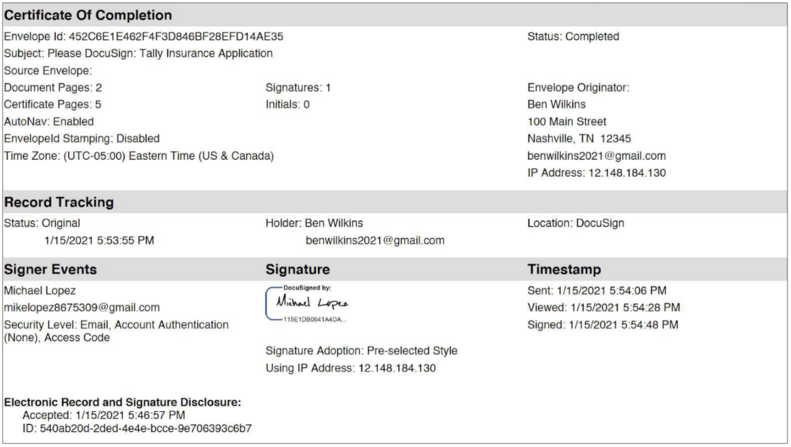Are Electronic Signatures Legal?
Electronic signatures (e-signatures), which demonstrate an individual’s consent to an agreement, aren’t new. Their acceptance and use in many countries around the world have been widespread for years. Over a billion users worldwide are comfortable signing documents electronically. But, are electronic signatures legal?
The short answer is yes, electronic signatures are legal. But what this question is really getting at is whether an e-signature can create a binding and enforceable contract. And, again, the short answer is yes. Electronic signatures are widely recognized and accepted throughout the industrialized world, and they are also more secure than traditional paper-based signatures and thus less susceptible to forgery.
In this blog post, we’ll cover what makes e-signatures legally binding, whether they’re valid in the US, whether there are exceptions, what exactly is an e-signature and more.
What makes an electronic signature legally binding?
In 2000, the U.S. federal government passed the Electronic Signatures in Global and National Commerce Act (ESIGN), which in tandem with the Uniform Electronic Transactions Act (UETA) confirms that electronic signatures constitute legally binding documents if all parties choose to sign digitally.
E-signatures cover the full range of technologies and solutions to create signatures electronically, from simple images of a signature attached to an electronic document to PKI-based signatures. A variety of capture methods can be used, such as:
- Clicking “I Agree” on a website
- Signing with your finger on a mobile device
- Typing your name or PIN into an online form
- Using an e-signature solution like DocuSign eSignature
Are electronic signatures valid in all states?
Yes, electronic signatures are valid in all U.S. states and are granted the same legal status as handwritten signatures under state laws. In other industrialized countries, electronic signatures carry the same weight and legal efficiency as handwritten signatures and paper documents. Laws may differ, but you can learn more about legal requirements in your country from DocuSign’s eSignature Legality Guide.
An electronic signature, like those supported by DocuSign eSignature, is typically all that is needed to create a legally enforceable document. For those instances where more authentication is required in the U.S. (e.g., certain transactions in regulated industries such as life sciences), tools like DocuSign standards-based signatures, can be used to digitally sign a document. This also applies to regions like the European Union, where digital signatures are more common.
Are electronic signatures legally enforceable?
When e-signatures are combined with tamper sealing, strong authentication, world-class security and an audit trail, they provide stronger court admissible evidence than a simple wet signature or scanned image of a signature on a PDF.
Typically for wet signatures, validity and attribution are established by comparing copies of signatures and presenting testimony from handwriting experts or witnesses who were present at the signing. Not only is this expensive and time consuming, it’s less reliable due to the human element. By removing the chance for human error and automating the entire data capturing process, audit trails make it easier to establish authenticity and address disputes over signatures both in state and federal courts.
Tyler Newby, Partner at Fenwick & West LLP does an excellent job outlining just how valuable audit trails are in authenticating e-signatures in court in his article, “Using E-Signatures in Court—The Value of an Audit Trail.”
For each document, DocuSign eSignature automatically generates and stores a complete, time-stamped history of every send, view, print, sign or decline action. The information on the signer, the signing event and the documents are maintained by the system in what we call a Certificate of Completion. The Certificate of Completion contains a summary about the signing event or envelope that includes:
- A specific Envelope ID
- The identity of the sender
- The identity of the signer(s) of the documents
- A graphic representation of their signatures
- The date and time stamp of when the document was sent, when it was viewed and when it was signed
- The IP address where each of the above actions took place

The Certificates of Completion are available to all parties to any agreement and DocuSign maintains electronic copies of the Certificate of Completion in its secure data centers.
DocuSign also offers advanced features, including multiple built-in, advanced authentication tools in DocuSign eSignature, as well as PKI-based signature options for complying with EU law like eIDAS and industry-specific regulations like FDA 21 CFR Part 11 in life sciences and U.S. State Professional Engineering Seals for architecture, engineering and construction.
What types of documents can be signed electronically?
Electronic documents and signatures are broadly enforceable for business and personal transactions in industrialised countries around the world. Many common business documents can be signed electronically, including:
- Offer letters, new hire paperwork and employee policy updates
- Non-disclosure agreements, statements of work and sales contracts
- Purchase orders and master service agreements
- Real estate transactions
- Account opening paperwork
- Insurance policy applications and claims
- Student services
- Patient intake forms
That said, like anything in life, there are some exceptions. As outlined by the National Telecommunications Information Administration (NTIA), electronic signatures are not legally valid when signing:
- Wills and testamentary trusts
- State statutes governing divorce, adoption or other family law
- Court orders or official court documents
- Notice of cancellation of utility serves
- Notice of default, foreclosure or eviction for a primary residence of an individual
- Termination notice for health or life insurance policies
- Recall notices for products that demonstrate a considerable risk to health or safety
- Any document legally required to transport hazardous materials, pesticides or other toxic substance
You should always refer to laws in your jurisdiction regarding your specific e-signature use case.
For more on the admissibility of DocuSign eSignature and electronic signatures, read DocuSign’s Court Support for Electronic Signatures in the United States whitepaper.
Learn more about DocuSign eSignature.